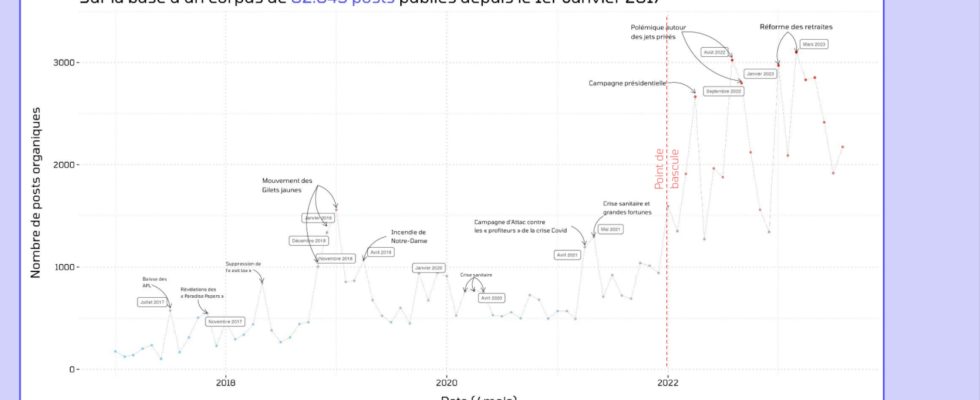From billionaires singled out for their contribution to global warming to big bosses castigated for their remuneration deemed disproportionate, there reigns in France an increasingly hostile discourse towards those who are referred to by the shortcut of “ultra-rich “. Two researchers specializing in the analysis of disinformation and online radicalism, Damien Liccia and Jean-Baptiste Delhomme, tried to determine how this expression had gradually become established in the public debate. Their studypublished this Sunday, January 28 by the Strategic Information Observatory, the think tank they direct, draws on several tens of thousands of publications on social networks – mainly X and YouTube – since 2017, the year of accession to power of Emmanuel Macron.
First lesson: the term ultra-rich, which emerges sporadically through tax evasion scandals such as the Paradise Papers, or even during the health crisis, has only really exploded in the last two years on X. “From 2017 to 2022, the conversation on the subject takes place within relatively moderate and constant levels of interest. We thus note 7,477 posts published on average per year over this period. The annual flow of mentions of the ultra-rich was then multiplied by 3 on the years 2022-2023, with, on average, 22,628 posts published per year, a sign of a very clear turning point in the public debate”, point out the authors. In addition, 60% of the most viral publications in terms of engagement – sharing, likes, comments, etc. – also occur during this period.
The tipping point takes place in January 2022, in the middle of the presidential campaign. The “president of the rich”, according to the label which has stuck like chewing gum to the walker’s shoe since his first steps at the Elysée, is then in the running for a second term. But interest in the expression “ultra-rich” does not decline after the election. From the summer, in August then in September, the controversy surrounding private jets revived its use a little more, which we found in 3,000 monthly publications, still on put a part back in the machine. In August 2023, the last month analyzed by the study, more than 2,000 publications on the social network still target the “ultra-rich”. That is more than during the peak of popularity of the yellow vests. A high cruising speed. For a long time ?
Bernard Arnault wins the prize
This is what the think tank thinks, which sees the convergence of three phenomena. “A strategy of conflict on social networks, claimed by Nupes and accelerated after 2022 by the accession of new deputies to the National Assembly. Then, the resumption of this expression by ecologists from the radical fringe, which has become the most rapid to use the term ultra-rich. Finally, an encounter with the conspiratorial sphere which, after the health crisis, shifted to an anti-capitalist discourse, targeting an occult power in the hands of the most fortunate”, explain the authors. “Ultra-rich” has the merit of speaking to each of these activist bases, both as an object of social criticism but also political, directly towards the government of Emmanuel Macron. A good formula, in short.
The alliance of these three blocs, not always on the same political line, is sometimes formed around central personalities. This is the case of Monique Pinçon-Charlot. A sociologist both appreciated on the left for her very critical work on Emmanuel Macron signed in 2019 with her husband Michel Pinçon (The President of the ultra-rich) and praised by conspiracy theorists for her intervention in the obscure “documentary” Hold-Up. But criticism of the ultra-rich, beyond the sphere of the left and the far left, does not stop only at conspiracy theorists. An apolitical debate show, like C this eveningbroadcast on France 5, is also highlighted by the study as one of the main channels (with blast, TV Media And Let’s Dare to Cause) popularizing the expression and the narrative that accompanies it.
Who are the personalities specifically targeted through this portmanteau word? Apart from the figure of Emmanuel Macron, catalyst for criticism, Bernard Arnault wins the prize, according to data collected by the Strategic Information Observatory, ahead of Patrick Drahi and Vincent Bolloré. Not surprising: the boss of the LVMH group is the richest person in France, or even in the world according to the rankings. The two authors nevertheless note that the Wertheimer brothers, discreet owners of Chanel and jointly the third largest French fortune, are completely absent from the mentions. By correlating the personalities associated with the term ultra-rich to the thickness of their Wikipedia page, they draw a final conclusion: it is not enough to be very rich to be criticized, you also have to be famous.
